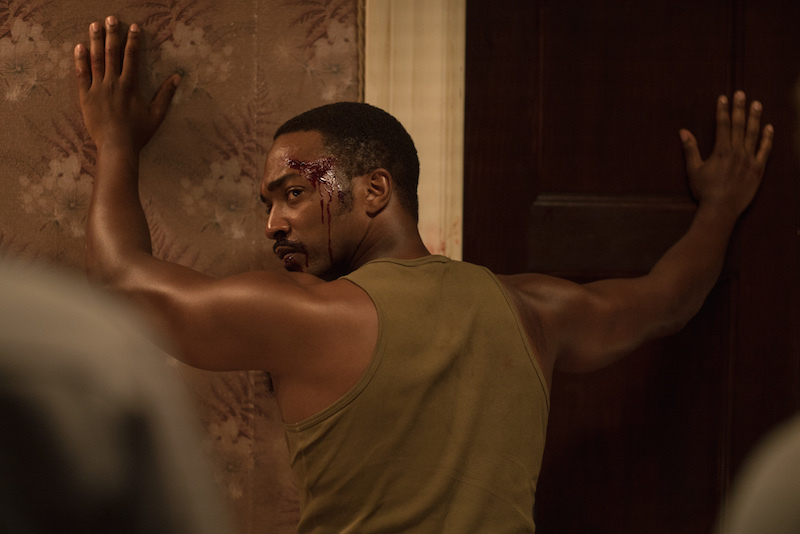
With Detroit, Kathryn Bigelow takes a sickening—and relatively unknown—case of police brutality that occurred during Detroit’s ’67 riots and brings it all-too-vividly to life. And I get why she did it. She knew that the incident would still feel depressingly relevant today. She knew that, thanks to her own skills as a director, she could create a film that would keep us in its stomach-churning thrall. Maybe she even thought she could change some hearts and minds by showing the ugliness of this event. One thing I’m sure she never intended was to create a film that feels somewhat exploitative, but I’m afraid that’s exactly what she has done.
A bit of background: As the riots are raging in Detroit, we meet charismatic young singer named Larry Reed (Algee Smith) and his best friend Fred (Jacob Latimore). Larry’s chance to make his debut at an upscale Motown theater has just been ruined by a police raid and he’s looking to hang low, maybe blow off some steam, so he and Fred head to the motel Algiers. There, they meet two flirtatious white girls (Hannah Murray and Kaitlyn Dever) at the pool and follow them to a room where the volatile Carl (Jason Mitchell) is brandishing a toy gun. Sensing that Carl is bad news, Larry and Fred retreat to another room, while the two girls end up hanging out with Vietnam vet Greene (Anthony Mackie). At some point that night, Carl gets the bright idea to shoot his toy gun out the window, sniper-style, toward the area where some cops and the National Guard have convened. He thinks it’ll just be a taste of their own medicine, a lark to see them scramble—instead, the cops raid the Algiers looking for the shooter.
At this point, we’ve already met the young cop who heads up the raid. His name is Krauss and he’s played with chilling malevolence by Will Poulter. Earlier in the film, he shot a looter in the back. He’s not just a racist cop—he’s a special kind of sadist. It’s hard to know what upsets Krauss and his cohorts more: That a shot rang out from the motel, or that they discover two white women in a room with a black man. Either way, they are crazed with rage, lining up the guests of the motel, making them face the wall, determined to get the gun and get their man.
The raid on the Algiers occurs about half an hour into the film and goes on for well over an hour. In that time, we see these young men and two women being pistol whipped and shot, terrorized, both emotionally and physically. Worst of all, the cops use some sort of “interrogation” technique that involves bringing a suspect into another room and pretending to shoot them in order to terrify those outside the door into confession. At first, Bigelow, who uses a handheld camera and cinema verité to style to put us right in the quaking shoes of the victims, doesn’t show us who has or hasn’t been killed. It feels sadistic, like we’re being toyed with. “Was this innocent young black man just gunned down in cold blood?” is not a game I care to play.
After the extended scene of brutality, the film feels off kilter, although it does give us one moment of grace. One of the survivors of the raid—I won’t say who—runs into a field, bruised and bloody, where he encounters a white cop. But instead of arresting or harming him, the cop is gentle—leading him to a squad car and taking him to the hospital. Some have suggested this is the film’s “Not All White Cops are Bad” moment but I see it differently. The fact that we fear for this character’s life when he encounters the cop speaks volumes. In a way, this moment of human compassion brings the true horror of what preceded it into high relief.
Still, despite its best intentions, the film has an insurmountable flaw: Poulter’s Krauss is a true monster and therefore, not a particularly interesting character. More interesting are his accomplices—his scared partner (Jack Reynor), who is cowed into a vicious act; another cop (Ben O’Toole), whose just-below-the-surface sadism is easily conjured; the national guardsman who knows better but still guiltily plays along. Then there’s Star Wars: The Force Awakens’ John Boyega as a dutiful security guard named Dismukes, who is the classic good man who does nothing (or at least not enough). And finally, there are a few State Police who see what’s happening inside them motel, know it’s wrong, and decide it’s Not Their Problem.
Detroit is loosely based on the events of that night and Bigelow, working with her regular screenwriter Mark Boal, fudges the details a bit to make the story more streamlined and compelling. This is her prerogative—I’m not a fundamentalist when it comes to “based on true events” film—but it leads to some characters behaving in perplexing ways. In particular, I never quite understood why the victims didn’t just give up Carl, the instigator. (Once you watch the film, their silence will become even more baffling.) Likewise, the film seems unusually ambivalent toward Boyega’s guard, perhaps reflecting the real life Dismukes’ own murky complicity in what took place.
In the end, Detroit ends up feeling like too much like a horror film, bordering on torture porn. Bigelow is too talented a director to make a film this unsubtle. Detroit is a classic of example of: Just because you can do something, that doesn’t mean you should.
